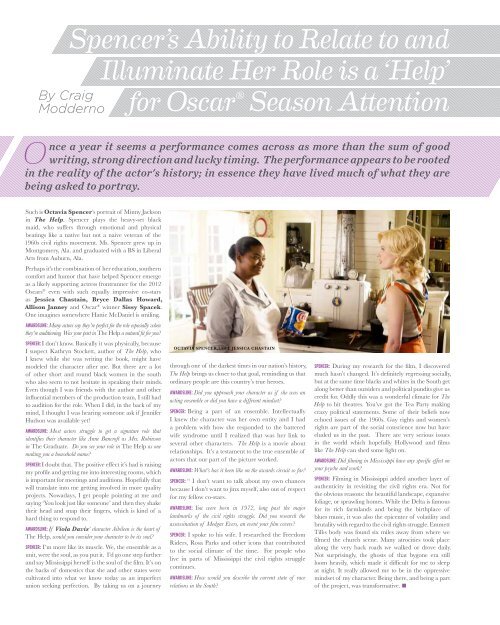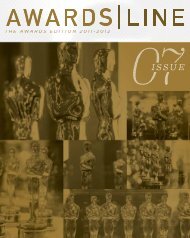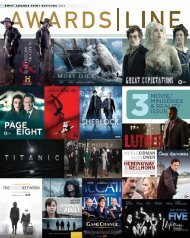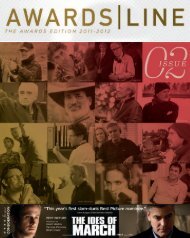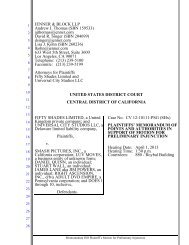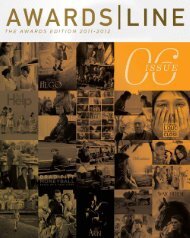( best actor).
( best actor).
( best actor).
You also want an ePaper? Increase the reach of your titles
YUMPU automatically turns print PDFs into web optimized ePapers that Google loves.
Spencer’s Ability to Relate to andIlluminate Her Role is a ‘Help’By CraigModdernofor Oscar ® Season AttentionOnce a year it seems a performance comes across as more than the sum of goodwriting, strong direction and lucky timing. The performance appears to be rootedin the reality of the <strong>actor</strong>'s history; in essence they have lived much of what they arebeing asked to portray.Such is Octavia Spencer’s portrait of Minny Jacksonin The Help. Spencer plays the heavy-set blackmaid, who suffers through emotional and physicalbeatings like a native but not a naive veteran of the1960s civil rights movement. Ms. Spencer grew up inMontgomery, Ala. and graduated with a BS in LiberalArts from Auburn, Ala.Perhaps it's the combination of her education, southerncomfort and humor that have helped Spencer emergeas a likely supporting actress frontrunner for the 2012Oscars ® even with such equally impressive co-starsas Jessica Chastain, Bryce Dallas Howard,Allison Janney and Oscar ® winner Sissy Spacek.One imagines somewhere Hattie McDaniel is smiling.AWARDSLINE: Many <strong>actor</strong>s say they’re perfect for the role especially whenthey’re auditioning. Was your part in The Help a natural fit for you?SPENCER: I don’t know. Basically it was physically, becauseI suspect Kathryn Stockett, author of The Help, whoI knew while she was writing the book, might havemodeled the character after me. But there are a lotof other short and round black women in the southwho also seem to not hesitate in speaking their minds.Even though I was friends with the author and otherinfluential members of the production team, I still hadto audition for the role. When I did, in the back of mymind, I thought I was hearing someone ask if JenniferHudson was available yet!AWARDSLINE: Most <strong>actor</strong>s struggle to get a signature role thatidentifies their character like Anne Bancroft as Mrs. Robinsonin The Graduate. Do you see your role in The Help as onemaking you a household name?SPENCER: I doubt that. The positive effect it’s had is raisingmy profile and getting me into interesting rooms, whichis important for meetings and auditions. Hopefully thatwill translate into me getting involved in more qualityprojects. Nowadays, I get people pointing at me andsaying ‘You look just like someone’ and then they shaketheir head and snap their fingers, which is kind of ahard thing to respond to.AWARDSLINE: If Viola Davis’ character Aibileen is the heart ofThe Help, would you consider your character to be its soul?SPENCER: I’m more like its muscle. We, the ensemble as aunit, were the soul, as you put it. I’d go one step furtherand say Mississippi herself is the soul of the film. It’s onthe backs of domestics that she and other states werecultivated into what we know today as an imperfectunion seeking perfection. By taking us on a journeyOctavia Spencer,left, JEssica chastainthrough one of the darkest times in our nation’s history,The Help brings us closer to that goal, reminding us thatordinary people are this country’s true heroes.AWARDSLINE: Did you approach your character as if she was anacting ensemble or did you have a different mindset?SPENCER: Being a part of an ensemble. IntellectuallyI knew the character was her own entity and I hada problem with how she responded to the batteredwife syndrome until I realized that was her link toseveral other characters. The Help is a movie aboutrelationships. It’s a testament to the true ensemble of<strong>actor</strong>s that our part of the picture worked.AWARDSLINE: What’s has it been like on the awards circuit so far?SPENCER: “ I don’t want to talk about my own chancesbecause I don’t want to jinx myself, also out of respectfor my fellow co-stars.AWARDSLINE: You were born in 1972, long past the majorlandmarks of the civil rights struggle. Did you research theassassination of Medgar Evers, an event your film covers?SPENCER: I spoke to his wife. I researched the FreedomRiders, Rosa Parks and other icons that contributedto the social climate of the time. For people wholive in parts of Mississippi the civil rights strugglecontinues.AWARDSLINE: How would you describe the current state of racerelations in the South?SPENCER: During my research for the film, I discoveredmuch hasn’t changed. It’s definitely regressing socially,but at the same time blacks and whites in the South getalong better than outsiders and political pundits give uscredit for. Oddly this was a wonderful climate for TheHelp to hit theatres. You’ve got the Tea Party makingcrazy political statements. Some of their beliefs nowechoed issues of the 1960s. Gay rights and women’srights are part of the social conscience now but haveeluded us in the past. There are very serious issuesin the world which hopefully Hollywood and filmslike The Help can shed some light on.AWARDSLINE: Did filming in Mississippi have any specific effect onyour psyche and work?SPENCER: Filming in Mississippi added another layer ofauthenticity in revisiting the civil rights era. Not forthe obvious reasons: the beautiful landscape, expansivefoliage, or sprawling homes. While the Delta is famousfor its rich farmlands and being the birthplace ofblues music, it was also the epicenter of volatility andbrutality with regard to the civil rights struggle. EmmettTill›s body was found six miles away from where wefilmed the church scene. Many atrocities took placealong the very back roads we walked or drove daily.Not surprisingly, the ghosts of that bygone era stillloom heavily, which made it difficult for me to sleepat night. It really allowed me to be in the oppressivemindset of my character. Being there, and being a partof the project, was transformative. •


